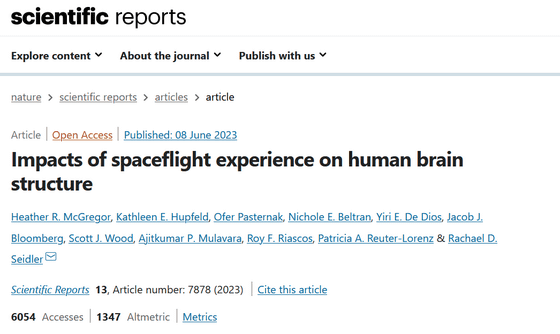It turns out that structural changes appear in the human brain when staying in space for a long time

Half a century has passed since mankind expanded its range of activities into outer space, but it is still unclear how long-term stays in outer space affect the human body. Researchers at the University of Florida and NASA's Johnson Space Center are investigating how the length of a space mission affects the human brain.
Impacts of spaceflight experience on human brain structure | Scientific Reports
https://doi.org/10.1038/s41598-023-33331-8

Spaceflight Can Induce Long-Lasting Structural Changes in The Human Brain : ScienceAlert
https://www.sciencealert.com/spaceflight-can-induce-long-lasting-structural-changes-in-the-human-brain

The human brain is covered with multiple thin membranes called meninges, and between the meninges and the brain is a colorless and transparent liquid called cerebrospinal fluid. This cerebrospinal fluid is produced in spaces called ventricles and acts as a cushion for the brain, washing away cellular waste and absorbing nutrients from the bloodstream.
The research team confirmed the images of MRI scans received by 30 astronauts. As a result, it was found that the longer the period of stay in space, the larger the size of the brain ventricles and the more the amount of cerebrospinal fluid.

According to the research team, under the microgravity of space, the brain moves upward within the skull, promoting expansion of the ventricles and an increase in cerebrospinal fluid. The research team suggests that this dilation of the ventricle may be a mechanism for responding to changes in the distribution of cerebrospinal fluid in the brain due to weightlessness.
Of the 30 astronauts, seven had less than three years between spaceflight missions and had less pronounced dilation of the ventricles. The research team believes that this is because the ventricle contracted once to cope with the increase in cerebrospinal fluid, and then went on a space flight mission before returning to normal.
It was also found that the greater the number of past spaceflight missions, the smaller the expansion rate of the brain ventricles. The researchers say that either the astronaut's brain has become accustomed to multiple missions and no longer swells, or the ability to cope with the stress of the mission has reached its limit.

``These findings suggest that the brain is subject to cumulative effects over multiple spaceflights, possibly adapting differently to the microgravity and space mission environments. ' argued.
Although it is not known exactly how expanding the size of the ventricles and increasing the volume of cerebrospinal fluid affect the health of astronauts, increased cerebrospinal fluid may be associated with spaceflight. It has also been shown that it may be related to poor eyesight.
Related Posts:
in Science, Posted by log1i_yk







